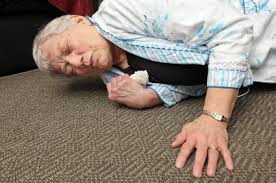
How can we help to prevent falls in the elderly ?
A few easy steps to take include;
- Mopping up spillages straight away.
- Removing clutter, loose wires and puckered carpets
- Using non-slip mats and rugs
- Using high-watt light bulbs in lamps and light so rooms are adequately lit
- Organise the home so less climbing and bending for items is required
- Encouraging the elderly person to ask for help with things they find difficult
- To wear well fitting footwear with a decent gripping sole and not socks
- Ensuring clothing fits and is not dragging on the floor
- Tuck bed clothes in if they are too long.
- Don’t leave bags/shopping on the floor
- Ensuring good foot health can also help
Seeking Advice
Elderly people can be both proud and stubborn and as such reluctant to seek advice following a fall. Many GP’s now have falls teams who thoroughly assess them and can really help to prevent subsequent falls. However healthcare professionals take the matter very seriously, fall prevention not only saves the elderly from nasty injuries and loss of independence but also saves the NHS millions of pounds each year.
Exercises.
Research has proven that balance and strength play a major role in fall prevention and many community centres and gyms offer specialist training programmes for older people. Exercise programmes that can be carried out at home are also available and they are shown what to do by a visiting healthcare professional.
There is also evidence that taking part in regular sessions of tai chi can help to reduce the risk of falls. Tai chi is a Chinese martial art that places special emphasis on balance, co-ordination and movement. However, unlike other martial arts, tai chi does not involve physical contact or rapid physical movements, making it an ideal activity for older people.
Looking at their Medication
A Doctor will need to review the medication of someone who is falling especially if they take more than four types a day as this is linked to falling and ensure they are still the best option of treatment. A medication review is recommended at least annually.
There may be alternative medications that you or they can use, or the current dose could be lowered. In some cases, it may be possible for the medication to be stopped.
Some types of medication used to treat sleep problems,anxiety and depression may also increase the chance of a fall and your GP may recommend gradually stopping them.
Eye Sight
Poor sight plays a part in falls and an elderly person needs to maintain regular sight tests. Not all causes of visual impairment can be treated, but some can, for example, cataracts can be surgically removed.
Vitamin D and calcium
Vitamin D is used to strengthen muscles and bones and has been shown to help to prevent falls in people who are 65 and over.
Foods high in vitamin D include:
- liver
- oily fish
- wholegrain fortified breakfast
- cereals
- margarines and spreads
- well-cooked eggs
- evaporated milk
Sunlight is also a natural source of vitamin D so spending half an hour each day outside between April and September can also help.
There is some evidence to show that taking daily vitamin D and calcium supplements may help prevent falls in those who have a low level of vitamin D in their blood.
However, the vitamin D and calcium supplements that are found in supermarkets often do not contain a high enough amount to provide full protection. Speak to their GP if you think that they would benefit from having daily supplements. They will be able to prescribe stronger supplements.
Other Help Available
If you are concerned that a relative may be at risk of having a fall, or if you know someone who has recently had a fall, you can request a home hazard assessment.
The assessment will involve a healthcare professional with experience in fall prevention visiting your home, or your relative’s, to identify potential hazards and to give advice about how to deal with them.
The bathroom is a common place for falls to occur and many older people can benefit from having bars fitted to the inside of their bath to make it easier for them to get in and out.
The healthcare professional who carries out the assessment may also recommend getting a personal alarm system so that your relative can call for help in the event of a fall. An alternative would be to keep a mobile phone in close reach so that it is possible to phone for help after having a fall.

[…] detection is often a feature provided with these gadgets. With this, you can manage the risks of accidental falls and similar injuries. The tech will detect a fall immediately and automatically react. Therefore, […]